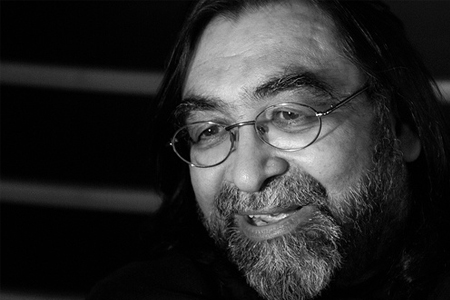Ad Guru, film director and social entrepreneur; one person who can effortlessly juggle between all these three hats is Mr. Prahlad Kakkar. He is best known for the famous Pepsi Advertisement featuring Sachin Tendulkar and Amitabh Bachchan. He is the founder-director of Genesis Film Production, one of India’s leading production houses and co-founder of ReefWatch Marine Conservation. Another distinguishing feather to his hat is him being a CMAS 2 star scuba diving instructor. He came to IIM Calcutta to inaugurate Intaglio 2014 and addressed the students as part of the Reverberations Speaker Series. Post the ceremony he interacted with the students and the transcript of our interview with him can be found below.
Q.) You talked about following your heart, but these days there are times when you need to follow your mind, therefore, do you see these two aspects as exclusive?
No they aren’t mutually exclusive. You can follow your mind as long as you’re passionate about it. But yes, if you’re doing something passionless, you’d never be good at it. Stakes are higher where you’re passionate. Safer the job is, more starkly soul-destroying it would be. High wages are paid for something which is dull, leading to higher attrition. So you’re trapped by the payment they give you, to which you sell your soul. Making decisions is the riskiest thing you can do in a company. Because as soon as you make a decision somebody comes in your way and, as long as you don’t make one, everyone is happy! You only know you made a big mistake in the hindsight, whereas, if you follow your heart, if things don’t work out, you can always go back and redo.
Q.) Your father was involved with Indian Military and your mother was a Burmese, how have these variations helped you evolve?
I went to school where I learned my first art of war. Then I went to college, where people said pursuit of Economics would get you a job. But I found military strategy there. I chose that because I was interested in it, I was passionate about it. I found it better than an MBA where you only learnt how to make money. This taught me how to kill people (chuckles). And, killing large amount of peoples efficiently, not just one or two.
Q.) But, they say art of war is to keep peace. What is your opinion?
Art of war is to win (period). And that’s what business is. There you’re conferred medals, here you get huge bonuses. Just that on the field it is tactics, and in the corporate world, it is the strategy.
Q.) So, as you’d say Marketing is also a form of war, then how does Business Ethics come into play?
What’s good enough for you and your children is good enough for everybody else. So you might insulate your children from what you’re trying to do. If you sell junk food, your children would want that too. Even in war, it is tit for tat. Like Americans genocided the Red Indians, because the Red Indians had no means to retaliate.
Q.) One question is asked about the evolution of Media, so how has the ad-man evolved in these 30 years?
I’ve evolved because I’ve followed my gut all the time! I’ve never followed research, dictum or fashion. In fact I’ve created it. As long as you’re learning and you’re not arrogant enough to think you know it all, you’re fine. I had a cameraman who was 77 year old, had a mind like a child. He was an amazing man, he was learning all the time, and innovative all the time. He used to do all the special effects in camera, and it used to be so difficult. He was so good at that. For a Cherry Blossom ad, we needed a sparkle on the toe, twinkle toes had to woo a girl. We were at a loss as it couldn’t be executed as per requirement. He found broken shards of Christmas tree bulbs, stuck it on to the shoe and then moved the light across it. It twinkled. So he was thinking all the time, and the solution despite being so simple was so innovative.
Q.) Recently there were campaigns on social media regarding society welfare etc. What are your views about it?
If they go viral, you get many hits. It is very powerful to reach out to the people.
Excerpts of the Interview at HBL:
Interviewed by:
Suvarna Athavale | Gaurav Keskar
Transcribed by:
Anika Tanwar | Sagar Garg
Follow IIM Calcutta at iimc.insideiim.com

